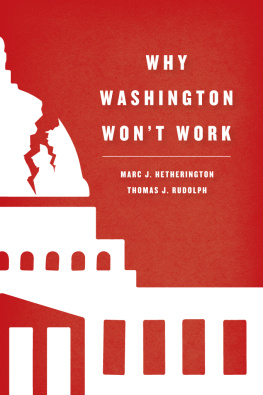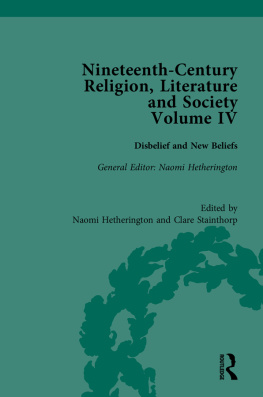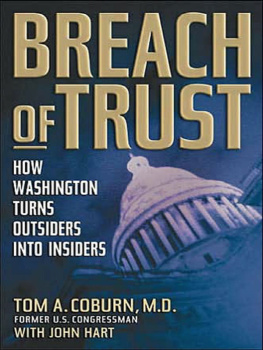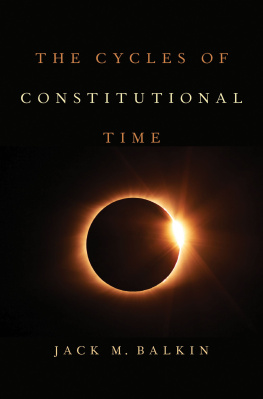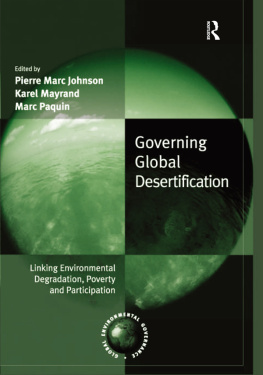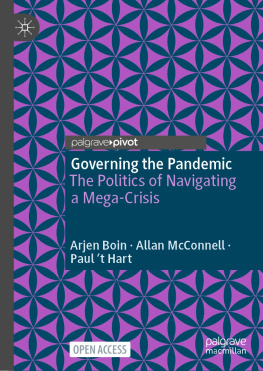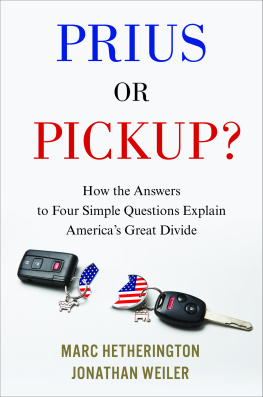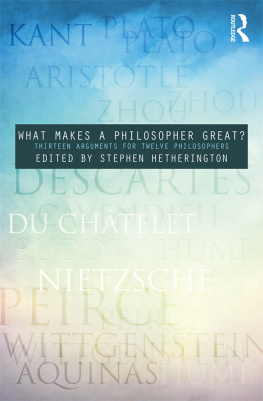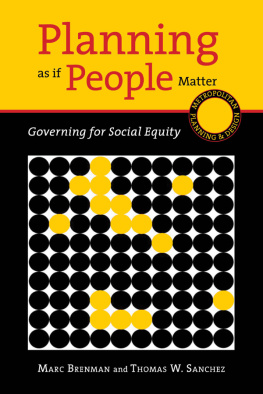Why Washington Wont Work
Chicago Studies in American Politics
A SERIES EDITED BY BENJAMIN I. PAGE, SUSAN HERBST, LAWRENCE R. JACOBS, AND ADAM J. BERINSKY
Also in the series:
LEGISLATING IN THE DARK: INFORMATION AND POWER IN THE HOUSE OF REPRESENTATIVES by James M. Curry
WHO GOVERNS? PRESIDENTS, PUBLIC OPINION, AND MANIPULATION by James N. Druckman and Lawrence R. Jacobs
TRAPPED IN AMERICAS SAFETY NET: ONE FAMILYS STRUGGLE by Andrea Louise Campbell
ARRESTING CITIZENSHIP: THE DEMOCRATIC CONSEQUENCES OF AMERICAN CRIME CONTROL by Amy E. Lerman and Vesla M. Weaver
HOW THE STATES SHAPED THE NATION: AMERICAN ELECTORAL INSTITUTIONS AND VOTER TURNOUT , 19202000 by Melanie Jean Springer
THE AMERICAN WARFARE STATE: THE DOMESTIC POLITICS OF MILITARY SPENDING by Rebecca U. Thorpe
CHANGING MINDS OR CHANGING CHANNELS? PARTISAN NEWS IN AN AGE OF CHOICE by Kevin Arceneaux and Martin Johnson
TRADING DEMOCRACY FOR JUSTICE: CRIMINAL CONVICTIONS AND THE DECLINE OF NEIGHBORHOOD POLITICAL PARTICIPATION by Traci Burch
WHITE-COLLAR GOVERNMENT: THE HIDDEN ROLE OF CLASS IN ECONOMIC POLICY MAKING by Nicholas Carnes
HOW PARTISAN MEDIA POLARIZE AMERICA by Matthew Levendusky
THE POLITICS OF BELONGING: RACE, PUBLIC OPINION, AND IMMIGRATION by Natalie Masuoka and Jane Junn
POLITICAL TONE: HOW LEADERS TALK AND WHY by Roderick P. Hart, Jay P. Childers, and Colene J. Lind
Why Washington Wont Work
Polarization, Political Trust, and the Governing Crisis
MARC J. HETHERINGTON
THOMAS J. RUDOLPH
THE UNIVERSITY OF CHICAGO PRESS
CHICAGO AND LONDON
MARC J. HETHERINGTON is professor of political science at Vanderbilt University. He is the author of Why Trust Matters and coauthor, with Jonathan D. Weiler, of Authoritarianism and Polarization in American Politics.
THOMAS J. RUDOLPH is professor of political science at the University of Illinois at Urbana-Champaign and coauthor of Expression vs. Equality.
The University of Chicago Press, Chicago 60637
The University of Chicago Press, Ltd., London
2015 by The University of Chicago
All rights reserved. Published 2015.
Printed in the United States of America
24 23 22 21 20 19 18 17 16 15 1 2 3 4 5
ISBN -13: 978-0-226-29918-1 (cloth)
ISBN -13: 978-0-226-29921-1 (paper)
ISBN -13: 978-0-226-29935-8 (e-book)
DOI : 10.7208/chicago/9780226299358.001.0001
Library of Congress Cataloging-in-Publication Data
Hetherington, Marc J., 1968 author.
Why Washington wont work : polarization, political trust, and the governing crisis / Marc J. Hetherington, Thomas J. Rudolph.
pages ; cm
Includes bibliographical references and index.
ISBN 978-0-226-29918-1 (cloth : alk. paper) ISBN 978-0-226-29921-1 (pbk. : alk. paper) ISBN 978-0-226-29935-8 (ebook) 1. Politics, PracticalUnited States. 2. TrustPolitical aspectsUnited States. 3. Polarization (Social sciences)United States. 4. United StatesPolitics and government2009. 5. Political partiesUnited States. I. Rudolph, Thomas J., author. II. Title.
E 893. H 48 2015
324.20973dc23
2015010765
This paper meets the requirements of ANSI / NISO Z 39.481992 (Permanence of Paper).
TO ELAINE GLOBETTI, IN MEMORIAM
MJH
TO HEATHER RUDOLPH
TJR
Contents
M arc J. Hetherington owes more debts than the Bible has psalms (apologies to House of Pain). Starting with the professional ones, Larry Bartels provided so much help and advice along the way that it is impossible to catalog. He provided us with the means to do the data collection that appears in , which was incredibly generous but was perhaps the least of his contributions. What was most helpful was the fact that his door is always open. Larry is the LeBron James of political science and not just because of his towering physical stature. He is always the best player on the court, but what makes him even more valuable is that he makes all the players around him better.
We benefited from a remarkable editorial team. John Tryneski gave us terrific direction at various points, which helped us mesh together the various moving parts of our analysis. We were fortunate to have two remarkable series editors as well. The project would not have gotten off the ground if not for the tireless work of Jamie Druckman. He made every one of our ideas crisper. And although we were unlucky to lose Jamie partway through, we were lucky to gain Adam Berinsky. He pushed us to be both more rigorous and more accessible. Although that might sound like contradictory advice, Adam provided us clear ideas about how to accomplish both. In addition, Rodney Powell was incredibly adept at moving the manuscript through the process. This group also secured two extraordinarily helpful reader reports that allowed us to put together a final manuscript that is both technically better and significantly more interesting than the draft we first submitted.
There are so many scholars who have helped us improve the final product. Jonathan Weilerboth a great friend and great coauthorprovided tons of guidance without even knowing he was doing it. As often seems to be the case, someone comes on the scene to make an unanticipated contribution. Jenny Mansbridge was that person for us. She e-mailed us a question about trust in government and got a draft of the book in response, surely not what she hoped for or expected. The feedback and encouragement she provided proved invaluable. Others read or commented on various drafts or engaged our ideas over the years. These people include Mike Nelson, Larry Evans, Ted Carmines, Bruce Larson, Alan Abramowitz, Jeremy Pope, Margie Hershey, Mike MacKuen, Dietlind Stolle, David Karol, Eric Belanger, Rick Wilson, John Alford, Tom Mann, Bill Jacoby, Frances Lee, and Jim Thurber. Numerous talks over the last few years at College of William and Mary, University of Maryland, University of Illinois, University of North Carolina, American University, McGill University, Rice University, University of Alabama, and Indiana University provided a bevy of great ideas as well.
Not among the names in the list above but a person especially important to us is Mo Fiorina. His book Culture War? is the starting place for every book and article that has been written on polarization in the past decade. As readers will see in the pages that follow, we share Mos view on some things but not on others. The key point here is that the clarity and cogency of his original argument inspired us to think for years about what is really going on in the mass public. We suspect that we are not alone in appreciating that inspiration.
Colleagues at Vanderbilt were also a big help, even fundamentally important at times. James Booth provided friendship and kept our eye on the big picture. Josh Clinton helped us solve every methodological problem we encountered. Josh and Dave Lewis were generous to allow us room on the Vanderbilt Poll to test our ideas about agency-specific trust, which appear in took Hetheringtons honors seminar about the public in American politics. They were great guinea pigs to try out some of the ideas that we were developing at that point, some of which they indicated worked and some of which they indicated did not.
Several people were not directly involved in this particular project, but it still bears their imprint. Bill Keefe, the best ever undergraduate teacher of political science, inspired Hetherington to go to graduate school, making his first steps in the profession possible. (In keeping with Bills style, we want to make clear that, given the large number of people who have been involved in the process, any mistakes that remain in the book are surely their fault, not ours.) Those first steps led Hetherington to Bob Luskin, the best ever dissertation supervisor. None of this would be possible without Bobs careful and tireless training. Finally, Jon Hurwitz has been the most generous of friends over the years, reconnecting him to his academic roots at the University of Pittsburgh. He was also an important sounding board for matters both big and small.

